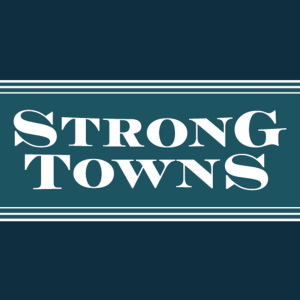
Ask Strong Towns: Celebrity Edition with Community-Conscious Developer Derek Avery
 2019-05-29
2019-05-29
Derek Avery is a community-conscious real-estate developer from Dallas, TX, whose work is rooted in the mantra of “revitalization without gentrification.” His company, COIR Holdings, takes a holistic approach to the neighborhoods it works in: not just building affordable homes, but forging relationships and seeking to lift up both the place and the people who already live there. Derek chats with Strong Towns founder and president Charles Marohn, and takes viewers’ live questions in this Ask Strong Towns: Celebrity Edition AMA webcast.
Questions discussed:
1:15 How’d you get into development?
4:05 Explain revitalization without gentrification. How is this not just a slogan, but a viable third way and something that you live and practice?
10:20 Talk about how you hire people locally, and what it means in a struggling neighborhood to create opportunity for the people who are there.
13:10 Negative perceptions of developers are widespread—“They just go into a poor neighborhood and exploit the people who are there.” How do you combat these perceptions?
16:00 Tell me a bit about your vision for what a revitalized neighborhood is and can be. How is Tulsa’s former Greenwood district an inspiration for you?
19:40 Efforts in early 2000s to expand low-income and minority homeownership backfired with the rise of predatory lending, often through subprime mortgages. How is your vision of building community ownership different from that? Why is it important to do it incrementally?
23:05 How do you identify a good project to pursue?
30:30 How can I find and encourage community developers to revitalize a small town? How do I grow my own Derek Avery in my own community?
34:25 What would you say to leaders in a community looking to make room for someone like you?
37:15 It seems like a lot of times, when a neighborhood is experiencing distress, one of our default responses as public officials is to add more regulation and create higher standards. You laughed at that. Why is that the wrong answer?
43:10 There’s a notion that all developers are rich, connected to rich people, or hucksters of some sort. People don’t understand the financing part, and so development makes them uncomfortable—can you help us understand?
47:20 How do you create positive momentum with development without triggering an increase in property valuations? Is there a sweet spot where you’re empowering people in a neighborhood, but not flooding it without outside investors trying to exploit that home-grown momentum?
51:30 The new federal Opportunity Zones seem to be targeting the kind of neighborhood that would benefit from small-scale development. How do you see that program affecting your work, and is it a positive or negative?
54:55 How does your work fit into the national conversation about race, equity, and righting historical wrongs?
1:01:15 What is your take on the relationship between wealth and power in historically disinvested and disenfranchised communities?
More Episodes
 2017-10-19
2017-10-19
 1.5k
1.5k
 2017-10-16
2017-10-16
 1.3k
1.3k
 2017-10-12
2017-10-12
 1.4k
1.4k
 2017-10-09
2017-10-09
 1.4k
1.4k
 2017-10-05
2017-10-05
 1.7k
1.7k
 2017-10-02
2017-10-02
 1.3k
1.3k
 2017-09-28
2017-09-28
 1.2k
1.2k
 2017-09-25
2017-09-25
 1.2k
1.2k
 2017-09-21
2017-09-21
 1.3k
1.3k
 2017-09-18
2017-09-18
 1.2k
1.2k
 2017-09-14
2017-09-14
 1.1k
1.1k
 2017-09-12
2017-09-12
 965
965
 2017-09-07
2017-09-07
 1.2k
1.2k
 2017-09-05
2017-09-05
 996
996
 2017-08-31
2017-08-31
 1.2k
1.2k
 2017-08-21
2017-08-21
 1.1k
1.1k
 2017-08-17
2017-08-17
 1.1k
1.1k
 2017-08-14
2017-08-14
 986
986
 2017-08-07
2017-08-07
 1.1k
1.1k
 2017-07-27
2017-07-27
 1.1k
1.1k
Create your
podcast in
minutes
- Full-featured podcast site
- Unlimited storage and bandwidth
- Comprehensive podcast stats
- Distribute to Apple Podcasts, Spotify, and more
- Make money with your podcast
It is Free
- Privacy Policy
- Cookie Policy
- Terms of Use
- Consent Preferences
- Copyright © 2015-2024 Podbean.com


